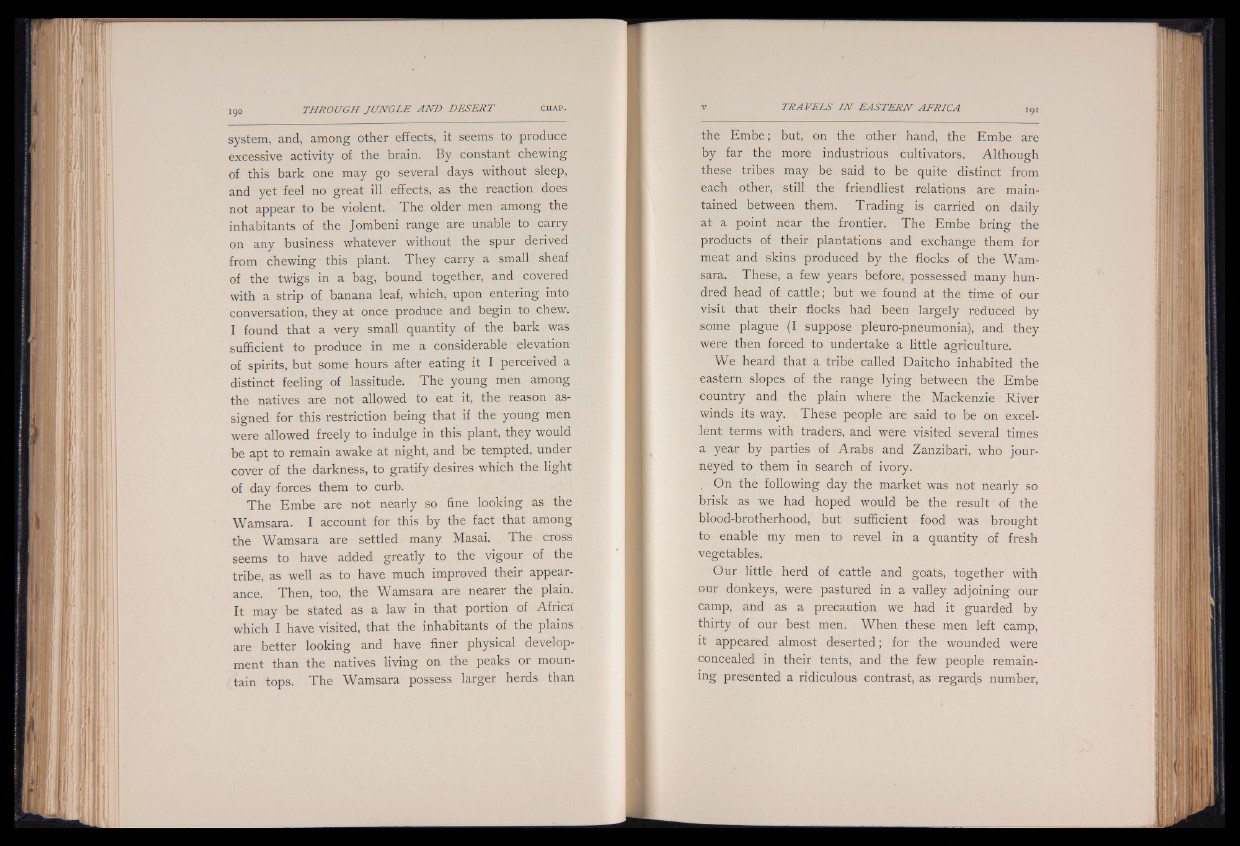
system, and, among other effects, it seems to produce
excessive activity of the brain. By constant chewing
of this bark one may go several days without sleep,
and yet feel no great ill effects, as the reaction does
not appear to be violent. The older men among the
inhabitants of the Jombeni range are unable to carry
on any business whatever without the spur derived
from chewing this plant. They carry a small sheaf
of the twigs in a bag, bound together, and covered
with a strip of banana leaf, which, upon entering into
conversation, they at once produce and begin to chew.
I found that a very small quantity of the bark was
sufficient to produce in me a considerable elevation
of spirits, but some hours after eating it I perceived a
distinct feeling of lassitude. The young men among
the natives are not allowed to eat it, the reason assigned
for this restriction being that if the young men
were allowed freely to indulge in this plant, they would
be apt to remain awake at night, and be tempted, under
cover of the darkness, to gratify desires which the light
of day forces them to curb.
The Embe are not nearly so fine looking as the
Wamsara. I account for this by the fact that among
the Wamsara are settled many Masai. The cross
seems to have added greatly to the vigour of the
tribe, as well as to have much improved their appearance.
Then, too, the Wamsara are nearer the plain.
It may be stated as a law in that portion of Africa
which I have visited, that the inhabitants of the plains
are better looking and have finer physical development
than the natives living on the peaks or moun-
; tain tops. The Wamsara possess larger herds than
the Embe; but, on the other hand, the Embe are
by far the more industrious cultivators.C Althougoh
these tribes may be said to be quite distinct from
each other, still the friendliest relations are maintained
between them. Trading is carried on daily
at a point near the frontier. The Embe bring the
products of their plantations and exchange them for
meat and skins produced by the flocks of the Wamsara.
These, a few years before, possessed many hundred
head of cattle; but we found at the time of our
visit that their flocks had been largely reduced by
some plague (I suppose pleuro-pneumonia), and they
were then forced to undertake a little agriculture.
We heard that a tribe called Daitcho inhabited the
eastern slopes of the range lying between the Embe
country and the plain where the Mackenzie River
winds its way. These people are said to be on excellent
terms with traders, and were visited several times
a year by parties of Arabs and Zanzibari, who journeyed
to them in search of ivory.
, On the following day the market was not nearly so
brisk as we had hoped would be the result of the
blood-brotherhood, but sufficient food was brought
to enable my men to revel in a quantity of fresh
vegetables.
Our little herd of cattle and goats, together with
our donkeys, were pastured in a valley adjoining our
camp, and as a precaution we had it guarded by
thirty of our best men. When these men left camp,
it appeared almost deserted; for the wounded were
concealed in their tents, and the few people remaining
presented a ridiculous contrast, as regards number,